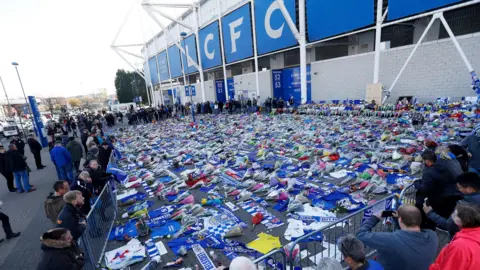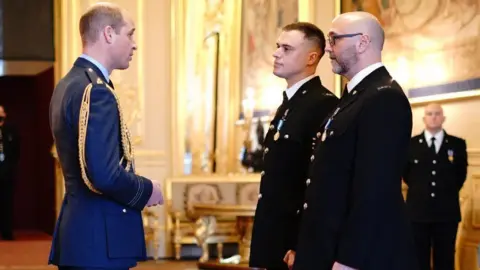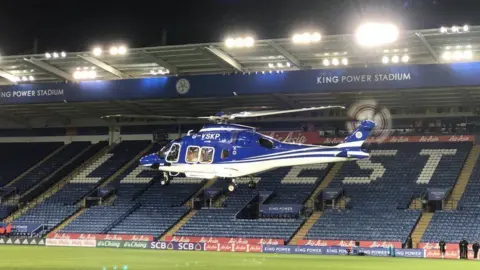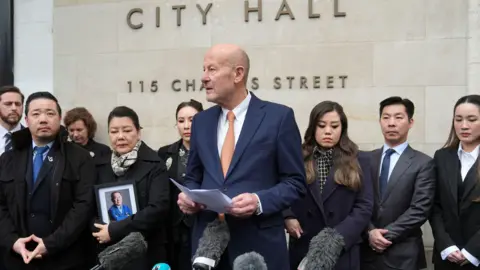Leicester helicopter crash inquest: What we learned
 Getty Images/Facebook/Instagram
Getty Images/Facebook/InstagramMore than six years after a helicopter crash at Leicester City's King Power stadium killed the club's chairman and four other people, an inquest into their deaths has finally concluded.
A jury at Leicester City Hall, with guidance from the coroner, concluded on Tuesday that the October 2018 disaster had been an accident.
But what were other the main takeaways from the hearing?
Warning: This story contains details that readers may find upsetting
We found out more about the victims
 Reuters
ReutersThe inquest began with tributes being paid to the five people who died on the night of 27 October 2018.
Vichai Srivaddhanaprabha's family said the former club chairman "was adored by everyone for his kind spirit, generosity, charm, sense of humour and intellect".
Helicopter pilot Eric Swaffer was described as "great company" and someone with a "profound love for aviation, technology, travel, his motorbike and life in general".
His partner, Ms Lechowicz, who was also a trained pilot, was remembered as a "warm, caring, hardworking" woman, and the wife of Kaveporn Punpare said he was loved and missed by his family every day.
Former Miss Thailand contestant Nusara Suknamai was described as a "pillar" of her family.
In a statement, they said: "This is the greatest loss for the family. We will never forget it."
The crash may have been survivable
The inquest heard from pathologist Dr Michael Biggs, who carried out post-mortem examinations for each of the five victims.
He revealed that only one of them - Ms Lechowicz - died from injuries caused by the impact of the helicopter coming down.
The other four would have died "quite rapidly" from smoke inhalation after a fire broke out in the aircraft following the crash.
He added it was entirely possible, indeed likely, that had it not have been for the fire, the injuries sustained by these four would have been survivable.
Emergency responders shared their stories
 PA Media
PA MediaVivid testimony came from two police officers who were among the first at the scene after the crash.
Sgt Michael Hooper and PC Stephen Quartermain happened to be driving nearby, having just been released from duty.
Sgt Hooper told the inquest he could hear the pilot, Mr Swaffer, shouting "get me out of here, help me" from inside the aircraft.
He told the coroner he used his baton to try to break the windscreen of the helicopter to no avail, and then ran to get a fire extinguisher from his police vehicle in an attempt to "buy [Mr Swaffer] a bit of time".
"It was incredibly hot at that point. The heat was pretty much unbearable," he said.
PC Quartermain became emotional as he recalled the moment "flames started to take towards the rear of the aircraft" and realised "the people were going to die".
He told the inquest Mr Swaffer "started to come round" after initially appearing "unconscious" and then "looked at Mike and I and started shouting 'help, get me out'".
Both officers went on to receive bravery awards for their efforts to save the crash victims.
Covid delayed the investigation
 Peter White
Peter WhiteThe inquest provided an answer to why it took the Air Accidents Investigation Branch (AAIB) almost five years to complete its investigation into the crash.
Mark Jarvis, principal inspector for the body, told the inquest that delays resulting from the Covid pandemic, as well as the need to get input from counterparts in other countries, had been major factors in the final report's publication being severely delayed.
He explained the pandemic caused "significant delays" of the transportation of components needed for investigations, while staff across Europe were not available and laboratories were closed.
"We were delayed in terms of how quickly we could get results," Mr Jarvis said.
It meant the target publication date of the final report ended up being pushed back from September 2021 to September 2023.
The jury was told what verdict to reach
Before retiring to deliberate, the 11 jurors were told by coroner Prof Catherine Mason that only an accidental conclusion could be reached - and their conclusions into where, when and how the five came to die could not legally dispute the AAIB's findings.
The following day, the jury's ruling that the crash was an accident duly arrived.
You might, therefore, wonder why a jury was required in the first place.
Guidance from the Courts and Tribunals Judiciary states that a coroner may request an inquest jury if the death or deaths were caused by a notifiable accident, poisoning or disease.
In delivering their conclusion, jurors told the coroner they found the helicopter "had all its appropriate airworthiness and maintenance certificates", adding Mr Swaffer had taken "all the appropriate actions available to him to try to regain control of the helicopter".
In fact, the inquest previously heard Mr Swaffer's actions reduced the rate of the helicopter's spin while he tried to "cushion" its impact in disorientating conditions, but "a crash landing was inevitable".
In response, Prof Mason told the court she would give "serious consideration" to issuing a prevention of future deaths report in the future.
Legal action will continue
 PA Media
PA MediaA few days before the inquest got under way, the family of Vichai Srivaddhanaprabha announced they were launching a £2.15bn legal claim against the aircraft's manufacturer, Leonardo.
Speaking outside Leicester City Hall following the inquest's conclusion, they pledged to continue with the action, describing the helicopter as a "death trap" and "an accident waiting to happen".
The AAIB's 2023 report into the crash said investigators had concluded the helicopter complied with "all applicable airworthiness requirements" and had been maintained correctly before the crash.
In a statement after the inquest, a spokesperson for the manufacturer said: "Leonardo agrees with the inquest jury's conclusion that this crash was a tragic accident.
"As the jury recorded, the helicopter had all the relevant airworthiness certificates.
"This is entirely consistent with the evidence provided to the inquest, that the helicopter was designed and produced in accordance with all regulatory requirements, meeting the accepted industry standard for safety."
Follow BBC Leicester on Facebook, on X, or on Instagram. Send your story ideas to [email protected] or via WhatsApp on 0808 100 2210.
